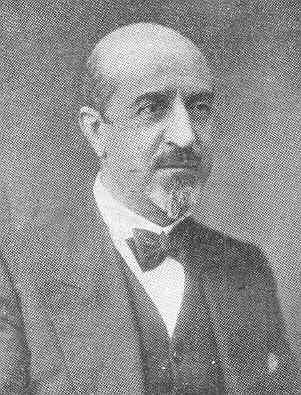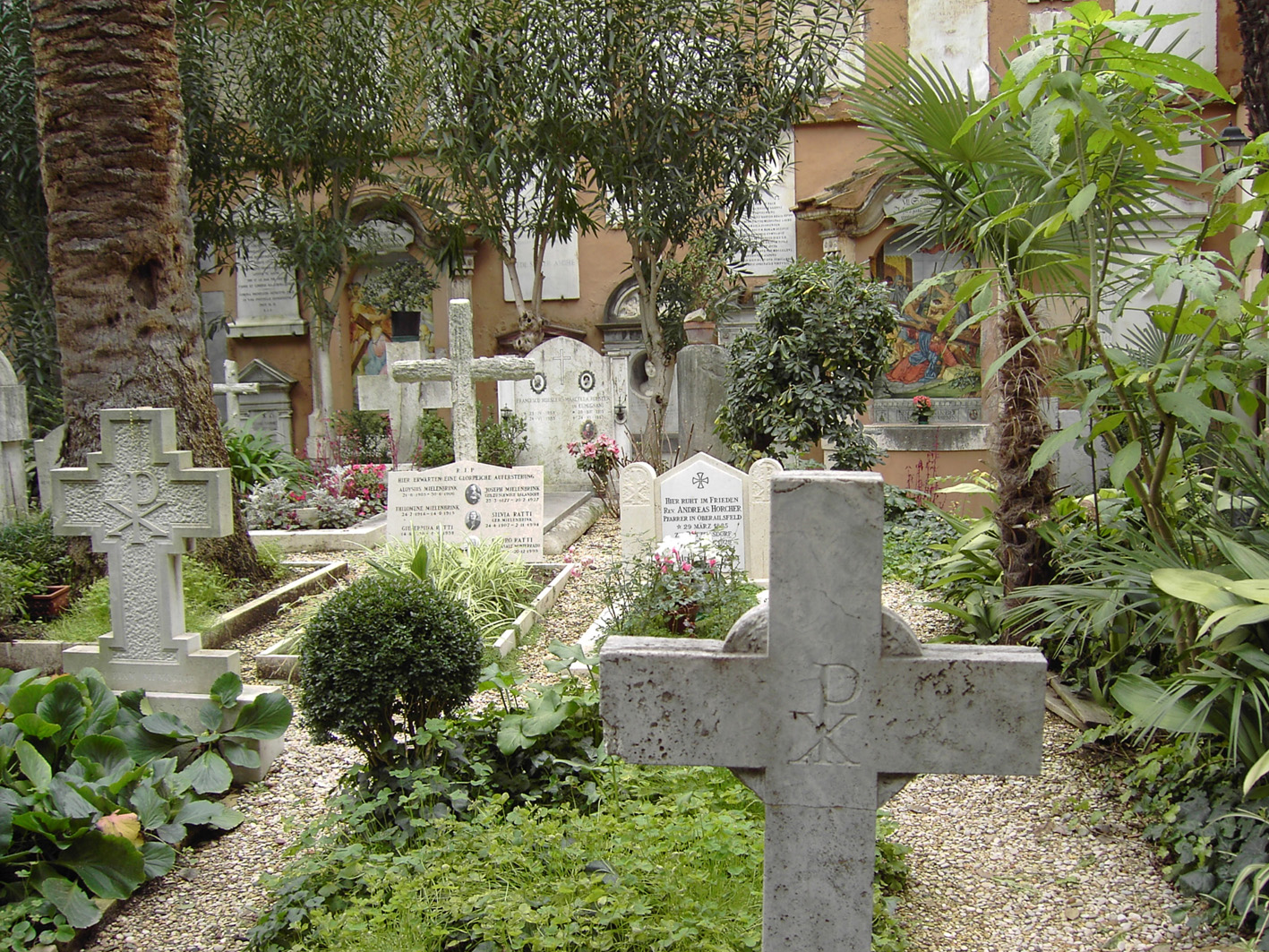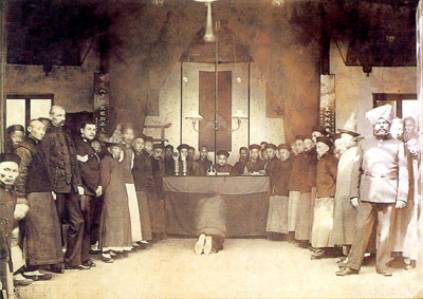|
Collegio Teutonico
The Collegio Teutonico (German College), historically often referred to by its Latin name Collegium Germanicum, is one of the Pontifical Colleges of Rome. The German College is the Pontifical College established for future ecclesiastics of German nationality. It is divided into two separate colleges; the Pontificio Collegio Teutonico di S. Maria dell’ Anima and the Collegio Teutonico del Campo Santo. Pontificio Collegio Teutonico di S. Maria dell’ Anima The Collegio Teutonico di S. Maria dell’ Anima is a residential college for priests who study at one of the Pontifical Athenaeums for advanced studies or work in the Roman Curia. It includes Santa Maria dell'Anima, the church of the German-speaking Catholics in Rome, and the adjacent Priests' College, a residential college of priests. Collegio Teutonico del Campo Santo The site of the Campo Santo dei Tedeschi goes back to the days of Charlemagne and was then called the Schola Francorum, a hospice for pilgrims. In the co ... [...More Info...] [...Related Items...] OR: [Wikipedia] [Google] [Baidu] |
Campo Santo Teutonico 1593
Campo may refer to: Places ;Cameroon * Campo, Cameroon, in the South Province ;Equatorial Guinea * Río Campo, in the Litoral Province ;France * Campo, Corse-du-Sud, a commune on the island of Corsica ;Italy * Campo P.G., a World War II prisoner-of-war camp * Campo, Cortina d'Ampezzo, a ''frazione'' in the province of Belluno, Veneto * Campo, San Giuliano Terme, a ''frazione'' in the province of Pisa, Tuscany * Campo (Venice), a type of square ;Portugal * Campo (Reguengos de Monsaraz), a parish in the municipality of Reguengos de Monsaraz * Campo (São Martinho), a former civil parish in the municipality of Santo Tirso * Campo (Valongo), a parish in the municipality of Valongo * Campo (Viseu), a parish in the municipality of Viseu * Campo e Tamel (São Pedro Fins), a civil parish in the municipality of Barcelos ;Spain * Campo, Spain, a municipality in the province of Huesca ;Switzerland * Campo, Vallemaggia, a municipality in the district of Vallemaggia in the canton of Ticin ... [...More Info...] [...Related Items...] OR: [Wikipedia] [Google] [Baidu] |
Lateran Treaty
The Lateran Treaty ( it, Patti Lateranensi; la, Pacta Lateranensia) was one component of the Lateran Pacts of 1929, agreements between the Kingdom of Italy under King Victor Emmanuel III of Italy and the Holy See under Pope Pius XI to settle the long-standing Roman Question. The treaty and associated pacts were named after the Lateran Palace where they were signed on 11 February 1929, and the Italian parliament ratified them on 7 June 1929. The treaty recognized Vatican City as an independent state under the sovereignty of the Holy See. The Italian government also agreed to give the Roman Catholic Church financial compensation for the loss of the Papal States. In 1948, the Lateran Treaty was recognized in the Constitution of Italy as regulating the relations between the state and the Catholic Church. Constitution of Italy, article 7. The treaty was significantly revised in 1984, ending the status of Catholicism as the sole state religion. Content The Lateran Pacts are often p ... [...More Info...] [...Related Items...] OR: [Wikipedia] [Google] [Baidu] |
Educational Institutions Established In The 14th Century
Education is a purposeful activity directed at achieving certain aims, such as transmitting knowledge or fostering skills and character traits. These aims may include the development of understanding, rationality, kindness, and honesty. Various researchers emphasize the role of critical thinking in order to distinguish education from indoctrination. Some theorists require that education results in an improvement of the student while others prefer a value-neutral definition of the term. In a slightly different sense, education may also refer, not to the process, but to the product of this process: the mental states and dispositions possessed by educated people. Education originated as the transmission of cultural heritage from one generation to the next. Today, educational goals increasingly encompass new ideas such as the liberation of learners, skills needed for modern society, empathy, and complex vocational skills. Types of education are commonly divided into formal, ... [...More Info...] [...Related Items...] OR: [Wikipedia] [Google] [Baidu] |
Catholic Church In Germany
, native_name_lang = de , image = Hohe_Domkirche_St._Petrus.jpg , imagewidth = 200px , alt = , caption = Cologne Cathedral, Cologne , abbreviation = , type = National polity , main_classification = Catholic , orientation = Christianity , scripture = Bible , theology = Catholic theology , polity = Episcopal , governance = German Bishops' Conference , structure = , leader_title = Pope , leader_name = Francis , leader_title1 = Chairman , leader_name1 = Georg Bätzing , leader_title2 = Primas Germaniae , leader_name2 = Franz Lackner , leader_title3 = Apostolic Nuncio , leader_name3 = Nikola Eterović , fellowships_type = , fellowships = , fellowships_type1 = , fellowships1 = , division_type = , division = , division_type1 = ... [...More Info...] [...Related Items...] OR: [Wikipedia] [Google] [Baidu] |
Catholic Church In Austria
, native_name_lang = de , image = Wien_-_Stephansdom_(3).JPG , imagewidth = 200px , alt = , caption = St. Stephen's Cathedral, Vienna. , abbreviation = , type = National polity , main_classification = Catholic , orientation = , scripture = , theology = , polity = Episcopal , governance = Episcopal Conference of Austria , structure = , leader_title = Pope , leader_name = Pope Francis , leader_title1 = Chairman , leader_name1 = Franz Lackner , leader_title2 = Primas Germaniae , leader_name2 = Franz Lackner , leader_title3 = Apostolic Nuncio , leader_name3 = Pedro López Quintana , fellowships_type = , fellowships = , fellowships_type1 = , fellowships1 = , division_type = , division = , division_type1 = , division1 ... [...More Info...] [...Related Items...] OR: [Wikipedia] [Google] [Baidu] |
1399 Establishments
Year 1399 ( MCCCXCIX) was a common year starting on Wednesday (link will display the full calendar) of the Julian calendar. Events January–December * January – Timur the Lame captures and sacks Haridwar. * February 3 – John of Gaunt, uncle of King Richard II of England and father of Henry Bolingbroke, dies. * March 18 – Richard II of England cancels the legal documents allowing the exiled Henry Bolingbroke to inherit his father's lands. * July 4 – While Richard II of England is away on a military campaign in Ireland, Henry Bolingbroke, with exiled former archbishop of Canterbury Thomas Arundel as an advisor, returns to England and begins a military campaign to reclaim his confiscated lands. * August 6 – Prince of Yan (Zhu Di) of China starts a rebellion in Beijing. * August 12 – Battle of the Vorskla River: Mongol Golden Horde forces, led by Khan Temür Qutlugh and Emir Edigu, annihilate a crusading army led by former Golden Horde Kha ... [...More Info...] [...Related Items...] OR: [Wikipedia] [Google] [Baidu] |
Teutonic Cemetery
The Teutonic Cemetery ( it, Cimitero Teutonico, "Camposanto of the Teutons and the Flemish") is a burial site adjacent to St. Peter's Basilica in Vatican City. Burial is reserved for members of the Confraternity of Our Lady of the German Cemetery, which owns the cemetery. It is a place of pilgrimage for many German-speaking pilgrims. History Located where the Circus of Nero once stood, during the period of the Roman Empire, it was the site of the martyrdom of many of the early Christians of the city. The cemetery chapel of Our Lady of Sorrows marks the spot where St. Peter was killed. It is reported that Pope Leo III gave the land to Charlemagne in 799 for a hospice, called the "Schola Francorum", for German pilgrims. In connection with the hospice was a church dedicated to the Saviour and a graveyard for the burial of the subjects of Charlemagne who died in Rome. Since the fifteenth century the soil of this cemetery has been held to be sacred earth from Jerusalem. This tradition ... [...More Info...] [...Related Items...] OR: [Wikipedia] [Google] [Baidu] |
Franz Joseph Dölger
Franz Joseph Dölger (18 October 1879, in Sulzbach am Main – 17 October 1940, in Schweinfurt) was a German Catholic theologian and church historian. He studied theology at the University of Würzburg, being ordained into the priesthood in 1902. Afterwards he worked as a chaplain in Amorbach and Würzburg, and in June 1904, obtained his doctorate in theology.Dölger, Franz Joseph In: (NDB). Band 4, Duncker & Humblot, Berlin 1959, , S. 19 f. In the winter and spring of 1904–05, he participated in a study group to , |
Extraterritorial
In international law, extraterritoriality is the state of being exempted from the jurisdiction of local law, usually as the result of diplomatic negotiations. Historically, this primarily applied to individuals, as jurisdiction was usually claimed on peoples rather than on lands. Extraterritoriality can also be partly applied to physical places, such as the immunity granted to diplomatic missions, military bases of foreign countries, or offices of the United Nations. The three most common cases recognized today internationally relate to the persons and belongings of foreign heads of state and government, the persons and belongings of ambassadors and other diplomats, and ships in international waters. Forms In the past, pre-modern states generally claimed sovereignty over persons, creating something known as personal jurisdiction. As people move between borders, this led, in the framework of a territorial jurisdiction, to certain persons being under the laws of countries in wh ... [...More Info...] [...Related Items...] OR: [Wikipedia] [Google] [Baidu] |
Pope Benedict XVI
Pope Benedict XVI ( la, Benedictus XVI; it, Benedetto XVI; german: link=no, Benedikt XVI.; born Joseph Aloisius Ratzinger, , on 16 April 1927) is a retired prelate of the Catholic church who served as the head of the Church and the sovereign of the Vatican City State from 19 April 2005 until his resignation on 28 February 2013. Benedict's election as pope occurred in the 2005 papal conclave that followed the death of Pope John Paul II. Benedict has chosen to be known by the title "pope emeritus" upon his resignation. Ordained as a priest in 1951 in his native Bavaria, Ratzinger embarked on an academic career and established himself as a highly regarded theologian by the late 1950s. He was appointed a full professor in 1958 at the age of 31. After a long career as a professor of theology at several German universities, he was appointed Archbishop of Munich and Freising and created a cardinal by Pope Paul VI in 1977, an unusual promotion for someone with little pastoral expe ... [...More Info...] [...Related Items...] OR: [Wikipedia] [Google] [Baidu] |
Latin
Latin (, or , ) is a classical language belonging to the Italic branch of the Indo-European languages. Latin was originally a dialect spoken in the lower Tiber area (then known as Latium) around present-day Rome, but through the power of the Roman Republic it became the dominant language in the Italian region and subsequently throughout the Roman Empire. Even after the fall of Western Rome, Latin remained the common language of international communication, science, scholarship and academia in Europe until well into the 18th century, when other regional vernaculars (including its own descendants, the Romance languages) supplanted it in common academic and political usage, and it eventually became a dead language in the modern linguistic definition. Latin is a highly inflected language, with three distinct genders (masculine, feminine, and neuter), six or seven noun cases (nominative, accusative, genitive, dative, ablative, and vocative), five declensions, four verb conjuga ... [...More Info...] [...Related Items...] OR: [Wikipedia] [Google] [Baidu] |
Hugh O'Flaherty
Hugh O'Flaherty (28 February 1898 – 30 October 1963), was an Irish Catholic priest and senior official of the Roman Curia, and a significant figure in Catholic resistance to Nazism. During World War II, O'Flaherty was responsible for saving 6,500 Allied soldiers and Jews. His ability to evade the traps set by the German ''Gestapo'' and ''Sicherheitsdienst'' (SD), earned O'Flaherty the nickname " The Scarlet Pimpernel of the Vatican". After the Second World War he was named a papal domestic prelate by Pope Pius XII and served as notary of the Holy Office, working alongside and assisting Alfredo Cardinal Ottaviani until 1960. Early life Shortly after Hugh O'Flaherty's birth in Lisrobin, Kiskeam, County Cork, his parents, James and Margaret, moved to Killarney. The family lived on the golf course where James O'Flaherty worked as a steward. By his late teens, young O'Flaherty had a scratch handicap and a scholarship to a teacher training college. However, in 1918 he enro ... [...More Info...] [...Related Items...] OR: [Wikipedia] [Google] [Baidu] |









